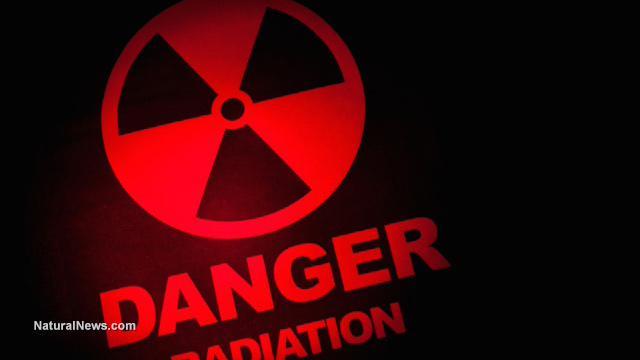Woman overtreated for thyroid cancer was isolated in lead-lined room for three days because she was emitting so much radiation
Friday, July 15, 2016 by: Isabelle Z.
Tags: cancer, overtreatment, radiation treatments

(NaturalNews) Lois Lunsk underwent surgery nine years ago to remove her thyroid and a number of lymph nodes. Following the operation, she was given a dose of radioactive iodine capsules and forced to spend three days in isolation in a room lined with lead, because her body was emitting such a high amount of radiation.
Her treatment was considered state-of-the-art at the time, but by today's standards, it can only be described as overzealous. The radioactive iodine capsules she was given were double the current maximum, and patients who get the same treatment for her condition are now normally home from the hospital within a day.
Lunsk is far from the only person to have such an experience. In many fields of oncology, particularly the treatment of thyroid and breast cancers, overtreatment and over-diagnosis are rampant, with people receiving treatment that is more aggressive than necessary, or getting treatment when none is needed in the first place.
Panel of doctors declares one type of 'cancer' isn't cancer after all
In April, a panel made up of 24 thyroid pathologists from around the world stated that one subtype of the most common type of thyroid cancer is actually not even cancer at all, striking the term "carcinoma" from its name. They also concluded that the current standard treatment involving surgery and radioiodine is an overtreatment.This lines up with a shocking report from the National Cancer Institute in 2013 that was essentially glossed over by the mainstream media. The government study's report revealed that more than 1.3 million people had been wrongly diagnosed with cancer. The emphasis on early diagnosis has resulted in millions of people getting damaging cancer treatments such as radiation, surgery and chemotherapy for diseases that they never actually had.
According to the study, which was published in the Journal of the American Medical Association, many human tissue lesions are being labeled as cancer despite the fact that they would not have led to any serious harm if they had been left untreated.
Meanwhile, the cancer industry remains a profitable one, with $100 billion in chemotherapy revenues coming in every year. It's pretty easy to see what might be going on here.
The author of You Don't Have to be Afraid of Cancer Anymore, Bill Sardi, believes that cancer is prevalent, and that many people will die with some type of cancer in their system, but that they won't die from it. He points out the problem with using invasive and dangerous screening methods such as mammograms, needle biopsies, and x-rays on tumors that might never end up causing problems in a person's lifetime.
People who are diagnosed with some type of cancer are urged to get a second opinion and learn about the various treatment options available before jumping directly into chemotherapy. Getting a cancer diagnosis is frightening, but it's important to keep a level head and make sure it is accurate and that the treatment is appropriate and not overzealous.
How to protect yourself from harmful radiation
X-rays and thyroid cancer treatment aren't the only sources of radiation out there. For example, Japan's recent nuclear catastrophe saw winds blowing radiation across a wide area, spurring many people to stock up on potassium iodide. If you want to protect your body against radiation from sources like dirty bombs and nuclear plant accidents, nascent iodine can cause radiation to pass through your body because it will have nothing to bind to. That's why it's important to already have iodine in your body before you are exposed to radiation.Sources include:
Philly.com
NaturalNews.com
NaturalNews.com
NaturalNews.com
Science.NaturalNews.com
Cancer at FETCH.news
Get independent news alerts on natural cures, food lab tests, cannabis medicine, science, robotics, drones, privacy and more.
Take Action: Support Natural News by linking to this article from your website
Permalink to this article:
Embed article link: (copy HTML code below):
Reprinting this article:
Non-commercial use OK, cite NaturalNews.com with clickable link.
Follow Natural News on Facebook, Twitter, Google Plus, and Pinterest
- Newly released JFK files reveal Pentagon's role in creating Lyme disease and covid in the same lab
- Ginseng's hidden anti-aging power: How compound K is rewriting the rules of skincare
- “Endgame: The Hidden Agenda 21” unveils a world of conspiracy and control
- L.A.'s rebuilding nightmare: Only 4 permits issued after fire destroys 6,000 homes
- Dr. Suzanne Humphries makes bombshell appearance on Joe Rogan podcast, exposing vaccine industry deception back to POLIOMYELITIS
- Scientists demand FDA withdraw mRNA COVID vaccines amid contamination and gene therapy concerns
- Former Congresswoman exposes CCP's deep infiltration of California through universities, ports, and fentanyl
- “The shame of Minnesota”: Somali immigrants behind $250 million child nutrition fraud in largest COVID-era scam
- PROCESSED TABLE SALT in foods found to fuel depression
- “Independent” anti-Russia outlet MEDUZA faces COLLAPSE as US funding dries up
- Here are TEN all-natural ways to protect your garden without using harmful chemicals
- BPA: The hidden hormone disruptor sabotaging your health - and how to fight back
- Chewing gum's dirty secret: How your daily habit could be flooding your body with microplastics
- The hidden battle in your glass: How A1 and A2 milk could shape your health
- Discovery of vast underground city beneath Giza pyramids challenges human history
- Catastrophic 7.7 earthquake devastates Myanmar and Thailand; death toll could reach 100,000
- Black cumin seed oil emerges as a powerful ally against breast cancer and chronic inflammation
- CDC finally halts $11 billion COVID funding scam as health officials admit the ‘pandemic’ was a fraud
- Newly released JFK files reveal Pentagon's role in creating Lyme disease and covid in the same lab
- Analysis: The coming economic collapse, a mass uprising and Trump's three secret weapons to halt the growing revolt
- Festive flavors: The sweet history, nutritional profile and health benefits of pecan pie
- Elon Musk: Aliens could be here on Earth RIGHT NOW
- Trump reverses course on Gaza plan, says “nobody is expelling Palestinians”
- Big Pharma's $8 Billion bribery scheme exposed: how doctors are pushed to prescribe junk science, not heal
- Boys are back in town: Trump’s patriotic alpha crew takes the wheel while toxic females ride in the backseat
- Reclaim your health: How midlife exercise reverses years of inactivity
- A lack of integrity in Academia: Harvard professor found GUILTY of fraudulent research to promote CRT theory
- Survival 101: Effective EMF blocking techniques
- EPA advisor admits the agency is funneling billions to climate groups ahead of Trump’s return to White House
- Dr. Mike Yeadon releases 15-minute testimony - WATCH - about genocidal intent of COVID “vaccines”
- 5 Simple steps to boost your brainpower: How to strengthen executive function in a distracted world
- Florida takes a stand: DeSantis proposes permanent ban on mRNA vaccine mandates
- Sugarcane extract superior to cholesterol-lowering drugs?
- Mike Adams Sermon 66: God will DESTROY ISRAEL for its wickedness
- Pilots report mysterious lights 'moving at extreme speeds' across Oregon skies
- Space war brewing? Russia threatens to destroy Starlink satellites
- EPA advisor admits the agency is funneling billions to climate groups ahead of Trump’s return to White House
- California's social media censorship law struck down: A victory for free speech or a threat to online safety?
- The Health Ranger releases “Vaccine Zombie” song and music video, using AI-animated zombies for the music video
- Dr. Mike Yeadon releases 15-minute testimony - WATCH - about genocidal intent of COVID “vaccines”
- The pandemic as a tool for INDOCTRINATION: Understanding “The Indoctrinated Brain” by Dr. Michael Nehls
- Newly released JFK files reveal Pentagon's role in creating Lyme disease and covid in the same lab
- Florida takes a stand: DeSantis proposes permanent ban on mRNA vaccine mandates
- Mike Adams releases country western hit single: Goin’ Back in Time is Comin’ Home
- Mike Adams releases music poetry sensation: A Child of God
- “Why we influenced the 2020 elections”: Facebook files reveal the coordinated effort to bury the Hunter Biden laptop story
- Unpacking the Lies That We’ve Been Fed – new song and music video released by Mike Adams, the Health Ranger
- RFK Jr. clears key hurdle: Sen. Susan Collins backs controversial HHS nominee, signaling a new era for health policy
- Mike Adams releases new song and music video: Nothing More Disgusting Than a Globalist
- Michigan sheriff announces criminal investigation into 2020 election crimes, Dominion Voting Systems
- Israeli soldiers accused of even more torture and abuse in the West Bank
- Migrants are taking advantage of recent hurricanes to scam residents and loot their homes
- House Intelligence Committee calls for the ARREST and PROSECUTION of Dr. Anthony Fauci
- Rep. Nancy Mace introduces bill to ban biological males from female facilities on federal property
- Red Cross issues warning to stop blood plasma donations from vaccinated people
- Scientists confirm: GENIUS brain function can be spontaneously unleashed in humans without any apparent cause
- EPA advisor admits the agency is funneling billions to climate groups ahead of Trump’s return to White House
- HYSSOP: What research reveals about the health benefits of this ancient holy herb
- Two containers with completed ballots fall out of truck in Florida
- Fully vaccinated about to see “tsunami” of illness and death, warns virologist
- Global leaders unite to clamp down on “misinformation” with UN-backed Cascais Declaration
- BREAKING: 2025 NDAA authorizes mandatory military draft of WOMEN across America… as Pentagon pursues global NUCLEAR war with both Russia and China at the same time
- Michael Yon warns of a ZIONIST TAKEOVER in Trump’s second administration
- BOMBSHELL: DNA testing kits are a SCAM to develop ethnic-specific bioweapons
- Ozempic and Wegovy weight loss drugs are injectable LIZARD VENOM PEPTIDES that may unleash a devastating wave of organ failure… side effects align with symptoms of SNAKE BITES
- Israeli soldiers accused of even more torture and abuse in the West Bank
- These 13 countries just signed an agreement to engineer a global FAMINE by destroying food supply
- NASA admits that climate change occurs because of changes in Earth’s solar orbit, and NOT because of SUVs and fossil fuels
- RFK Jr. clears key hurdle: Sen. Susan Collins backs controversial HHS nominee, signaling a new era for health policy
- Sermon 30: How Jesus reveals Caesar’s FAKE CURRENCY and FALSE AUTHORITY
- Coriander seeds: Ancient medicine backed by modern science
- Arizona officials claim Maricopa County needs 10-13 days to tabulate results of the election
Science News & Studies
Medicine News and Information
Food News & Studies
Health News & Studies
Herbs News & Information
Pollution News & Studies
Cancer News & Studies
Climate News & Studies
Survival News & Information
Gear News & Information
News covering technology, stocks, hackers, and more



"Big Tech and mainstream media are constantly trying to silence the independent voices that dare to bring you the truth about toxic food ingredients, dangerous medications and the failed, fraudulent science of the profit-driven medical establishment.
Email is one of the best ways to make sure you stay informed, without the censorship of the tech giants (Google, Apple, Facebook, Twitter, YouTube, etc.). Stay informed and you'll even likely learn information that may help save your own life."
–The Health Ranger, Mike Adams












































